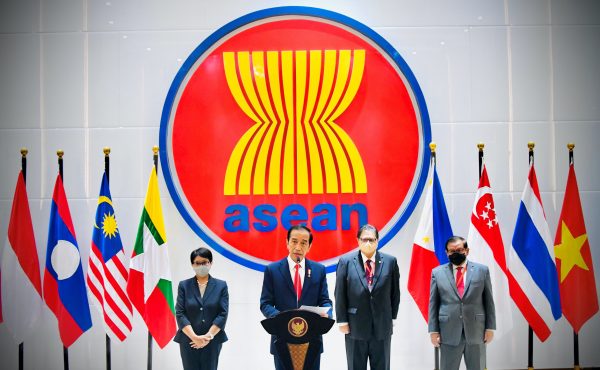The SAC, represented by its leader Senior General Min Aung Hlaing, made no overt objections during the meeting. Yet a press release issued by the SAC after the Senior General returned to Myanmar stated that its implementation will have to wait until the ‘situation returns to stability’. This attempt to buy time is not surprising considering there is no specific timeline in the document, and there is a real danger that the Myanmar military (Tatmadaw) will backtrack.
There is certainly no room for complacency. ASEAN needs to get to work immediately to ensure that the junta complies with the consensus, which contains three political outcomes and two mechanisms to achieve them. The outcomes are the immediate cessation of violence, the commencement of constructive dialogue, and the delivery of humanitarian assistance through the ASEAN Coordinating Centre on Humanitarian Assistance. The mechanisms are the establishment of a Special Envoy of the ASEAN Chair to facilitate the mediation of political dialogue and for the Special Envoy, with his or her delegation, to visit Myanmar to meet with all concerned parties.
For the Five-Point Consensus to be implemented, two key aspects must be considered.
First, speed is crucial. ASEAN’s Special Envoy must be appointed as soon as possible since he or she is expected to be in charge of an ASEAN task force responsible for monitoring the cessation of violence and coordinating the delivery of humanitarian assistance. The envoy will also have to convince all parties to engage in dialogue before actually mediating the process. It is therefore important to appoint a high-calibre individual with a strong legacy in ASEAN and experience in conflict mediation who is able to push the organisation beyond its non-interference principle while maintaining respect among Myanmar counterparts.
Second, the establishment of the task force requires substantial resources in terms of funding and personnel. To facilitate this, a dedicated ASEAN trust fund must be immediately established.
But where will the money and manpower come from? ASEAN member states must be the first to contribute. ASEAN is spearheading the political process because the organisation wants to deal with its own problem. This means contributions to the fund should first come from all ASEAN members according to their individual capacities. It is logical for the more economically capable members to contribute more. This will show the spirit of ASEAN as a true community and family.
Yet it is hard, if not impossible, for ASEAN to solely rely on resources from its own members. Contributions from outside ASEAN are certainly needed. As the international community has previously encouraged ASEAN to take the lead on the regional response to Myanmar’s crisis, it is time now for major and middle powers to provide ASEAN with the resources it needs to perform that task. Contributions are expected to come from regional powers such as India, China, and Japan. It is encouraging that Australia has already pledged AU$5 million (US$3.9 million). Other regional powers should follow suit to prove their commitment to Myanmar and the region.
International organisations such as the United Nations and European Union, as well as other humanitarian agencies, can also lend their support. Despite the current deadlock on Myanmar in the UN Security Council, the United Nations is already seeking solutions to the crisis, particularly by appointing its own special envoy. It remains to be seen how the organisation will practically collaborate with ASEAN. The same goes for the European Union, which has also voiced its commitment to support the dialogue process.
The soon-to-be appointed ASEAN Special Envoy will have to garner support and coordinate with these regional powers and international organisations to sustain ASEAN’s engagement with Myanmar. This is important as the effort to assist Myanmar is unlikely to be a short-term exercise.
Criticisms of ASEAN’s performance are always welcome, and should always be there as a basis for ASEAN’s improvement. But their sincerity can only be proven by also giving help in time of need. It is now time for the international community to show that it really cares about resolving Myanmar’s crisis — not with words, but with action.
Lina Alexandra is a Senior Researcher in the Department of International Relations at the Centre for Strategic and International Studies (CSIS) Indonesia.


As well as international support ASEAN needs a degree of internal solidarity. Unfortunately the rotating chair is held by Brunei, hardly a pinnacle of democracy. Perhaps Indonesia needs to take over the “driver’s seat” on the Myanmar question? A forthcoming test is the appointment of the Special Envoy, something that still has not been announced two weeks after the Summit. If someone with the appropriate gravitas and intra-ASEAN support – for example a former general and former president of Indonesia Susilo Bambang Yudhoyono – is chosen then we will know ASEAN is serious. If not, it is perhaps fair to to assume there is a degree of just going through the motions.
Ex post it is clear that the junta have not complied with any of the assurances given at the ASEAN meeting. Since then the National Unity Government (NUG) have moved towards a coordination of the ethnic insurgent armies of the Karen, Shan and Chin and their involvement in civilian protection from the Tatmadaw. This goes against the DNA of the NLD and the founder’s father Aung San. Counter intuitively one could now imagine that Daw Suu Kyi could be a potential asset to the junta, leading to her release. Furthermore, if people-driven insurgency is successful against the Tatmadaw is successful, one could imagine ASEAN leaders becoming very nervous at the precedent of people-led violence involving etnic and religious minorities or extremist movements thereof.